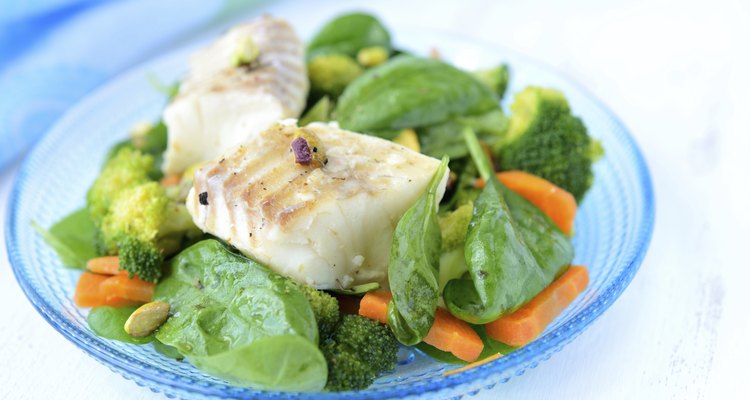
MarinaParshina/iStock/Getty Images
Produce and seafood contain many of the nutrients the human body needs to function normally, such as vitamins, minerals, essential fatty acids and antioxidants that protect against disease, in addition to low calorie counts. Certain types of fish and salads are less healthy than others, however, and preparation methods and additional ingredients can put your calorie limit over the edge if you're not careful.
Calories
The calories in fish vary along a spectrum from about 100 to 160 calories per serving, which is fewer than most meat servings. Steak provides about 170 calories per serving, and chicken provides approximately 150. Specific calorie amounts for different types of fish are as follows: salmon, 131; halibut, 94; trout,162 and yellowfin tuna, 110.
The calorie content in a simple salad with a green leaf base and a few toppings also provides a low calorie count. Green leaf lettuce provides only 4 calories per outer leaf, and each medium-sized tomato provides only 22 calories. Weight loss is more feasible if you add these ingredients in your diet, but beware of the additives and cooking ingredients that increase the calorie count quickly and, potentially, exponentially.
Fattening Ingredients
Salad dressing has a reputation for transforming a healthy, low-calorie salad into a fattening one. A tbsp. of olive oil alone provides 119 calories, which is as much as a serving of tuna. Double it and add balsamic vinegar and cheese, and your healthy salad just became a dieter's liability. Make your own salad dressing with herbs, spices, water and only 1 tbsp. of olive oil to reduce calories and preserve the integrity of your healthy salad.
Preparing fish provides similar opportunities for weight gain. Cook fish in a bamboo steamer, or bake it in the oven. Oily fish particularly need no additional oil or butter.
Fish Concerns
Shopping for fish requires knowledge and prudence to avoid adding toxins and a damaged conscience to your diet plan. Particular fish types contain mercury or other heavy metals and toxins or are endangered. Avoid Chilean sea bass, bluefin tuna, orange roughy, imported sturgeon caviar and imported shrimp. Eat wild, not farmed, fish to avoid possible toxins.
Considerations
Purchase the freshest salad ingredients possible to get a higher level of nutrients. Farmers markets provide fresh, seasonal produce, which also contributes to the local economy. To improve the likelihood that you will adhere to a diet, prepare vegetables in advance. Wash, chop and slice them. Place them in plastic bags and refrigerate them or blanch and freeze them for later use. Purchase wild, frozen fish and store it in the freezer for those times when fresh fish is unavailable.
Related Articles
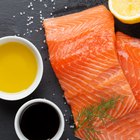
Calories in Wild Alaskan Salmon

How to Cook Bluefish
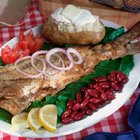
How to Cook a Bullhead Fish
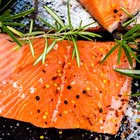
Baked Salmon Filet Nutrition Information

How to Cook Copper River Salmon
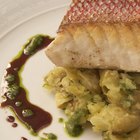
What Are the Health Benefits of Red ...
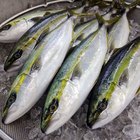
The Best Way to Smoke Yellowtail
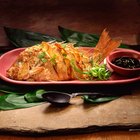
How to Cook Red Snapper Jamaican Style

How to Cook Frozen Salmon Fillets ...

Is Orange Roughy Safe to Eat?
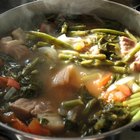
How to Make Sinigang

How Long Can Tuna Stay Fresh?

How to Pan-Sear Swordfish
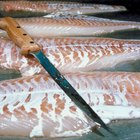
How to Grill a Cod Fish

How to Make Baked Haddock in a Foil ...
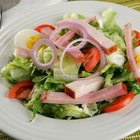
Chef Salad Nutrition Information
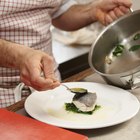
What Are the Benefits of Steamed Fish?
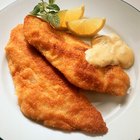
How to Fry Fish That Was Frozen
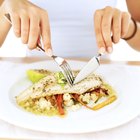
How to Cook Grunt Fish

How to Bake a Frozen Halibut Fillet
References
Writer Bio
Based in Richmond, Va., Tara Carson has written articles for editorial and corporate online and print publications for more than 10 years. She has experience as an adjunct professor of nutrition at Northwest Christian University and holds a Bachelor of Science in journalism and nutrition from Virginia Commonwealth University.
Photo Credits
MarinaParshina/iStock/Getty Images